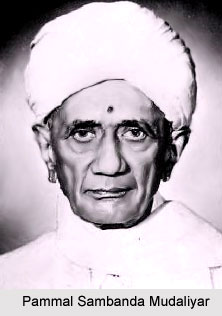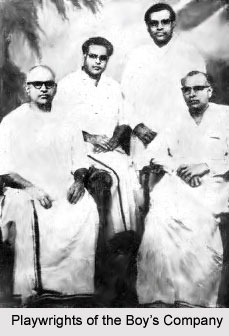 History of south Indian theatre can be associated with the flourishing expansion and growth of theatre from the Indian state of Karnataka, Tamil Nadu, Maharashtra, Andhra Pradesh and Kerala. The stage theatre first became popular in south India in the last quarter of the nineteenth century. During the 1870s, Parsi theatre and Marathi drama and theatre companies who camped and played in Chennai demonstrate that dramatic organizations were a commercial proposition. Soon after, local itinerant companies appeared, such as the Mohana Nataka Company founded by T.R. Govindaswamy Rao. When one of these companies, Sami Nayudu Nataka Company, played to packed houses in Chennai, it inspired some educated youth to take a closer look at the popular theatre.
History of south Indian theatre can be associated with the flourishing expansion and growth of theatre from the Indian state of Karnataka, Tamil Nadu, Maharashtra, Andhra Pradesh and Kerala. The stage theatre first became popular in south India in the last quarter of the nineteenth century. During the 1870s, Parsi theatre and Marathi drama and theatre companies who camped and played in Chennai demonstrate that dramatic organizations were a commercial proposition. Soon after, local itinerant companies appeared, such as the Mohana Nataka Company founded by T.R. Govindaswamy Rao. When one of these companies, Sami Nayudu Nataka Company, played to packed houses in Chennai, it inspired some educated youth to take a closer look at the popular theatre.
This trend, coupled with a growing interest both in English literature, particularly Shakespeare, and the study of the Sanskrit literature, created a new interest in legitimate theatre, as distinct from the popular variety. In 1891 Pammal Sambanda Mudaliyar founded an amateur dramatic club, the Suguna Vilasa Sabha, in Chennai and in time several others appeared in the district towns, such as Sudarsana Sabha of Thanjuvar and the Rasika Ranjani Sabha of Tiruchi.
But the new interest in legitimate theatre was confined to the city-based elite. It was the growing number of itinerant companies offering popular theatricals, which reached a wider and more varied audience. T.R. Govindaswamy Rao had set the model by running his Mohana Nataka Company, as a theatrical `family` whose members lived and travelled together and were able to influence one another considerably under these intimate conditions. Out of this and similar companies emerged a number of artistes who eventually formed their own companies in which the process was repeated. By 1920 the number of these itinerant drama companies was considerable.
 An offshoot of these troupes was the `Boys Company,` in which young boys under the age of twelve were recruited and trained in singing. These `Boys Companies` were easy to run, because problems of discipline were simplified, and cheap, because no wages were paid other than food and clothing. Samarasa Sanmarga Nataka Sabha, founded by Sankaradas Swamigal in 1910, was one of the earliest of such companies and Thapa Venkatachala Bhagvathar of Kumbakonam started a similar company in 1911. These companies moved from town to town camping for months in one place till they exhausted their repertoire. In addition to these two types there was a third category known as the `special drama` which was a kind of virtuoso performance. Playwrights like Sankaradas Swamigal and Ekai Sivashanmugam adapted many popular mythological stories for the stage and these adaptations became the standard versions. On certain occasions, actors who had specialized in specific roles in these plays assembled from different places and enacted the play, each one faithfully reproducing portions from the standard version. This was the `special drama.` By 1920, the number of companies and the popularity of performance had expanded so much that several drama halls were built in addition to the temporary sheds that served the purpose in smaller towns. Popular theatre had emerged as the single largest mass entertainment. In the first two decades of its existence, however, it remained purely an entertainment.
An offshoot of these troupes was the `Boys Company,` in which young boys under the age of twelve were recruited and trained in singing. These `Boys Companies` were easy to run, because problems of discipline were simplified, and cheap, because no wages were paid other than food and clothing. Samarasa Sanmarga Nataka Sabha, founded by Sankaradas Swamigal in 1910, was one of the earliest of such companies and Thapa Venkatachala Bhagvathar of Kumbakonam started a similar company in 1911. These companies moved from town to town camping for months in one place till they exhausted their repertoire. In addition to these two types there was a third category known as the `special drama` which was a kind of virtuoso performance. Playwrights like Sankaradas Swamigal and Ekai Sivashanmugam adapted many popular mythological stories for the stage and these adaptations became the standard versions. On certain occasions, actors who had specialized in specific roles in these plays assembled from different places and enacted the play, each one faithfully reproducing portions from the standard version. This was the `special drama.` By 1920, the number of companies and the popularity of performance had expanded so much that several drama halls were built in addition to the temporary sheds that served the purpose in smaller towns. Popular theatre had emerged as the single largest mass entertainment. In the first two decades of its existence, however, it remained purely an entertainment.
Nationalism was not the only element of this tumultuous period in Indian history which began to affect the concerns of popular theatre. Old beliefs and old patterns of behaviour were weakening in the face of western education, the import of new ideas and the establishment of the press and new forms of political organization. Out of this ferment came a realization that social reforms were a necessary element in the progress towards nationhood.
Until 1919, the popular theatre was content with putting on mythological plays. Stage artistes were regarded as veritable outcastes and they kept themselves away from the mainstream of society. It was the wave of anger that swept through the country following the Jallianwallah Bagh massacre in 1919 that triggered the process of politicisation in the popular theatre. The political activity stirred up by the country-wide opposition to the Rowlatt Act of 1919 and by the Non-cooperation Movement sustained this trend and inaugurated a new phase in the world of mass entertainment.




















